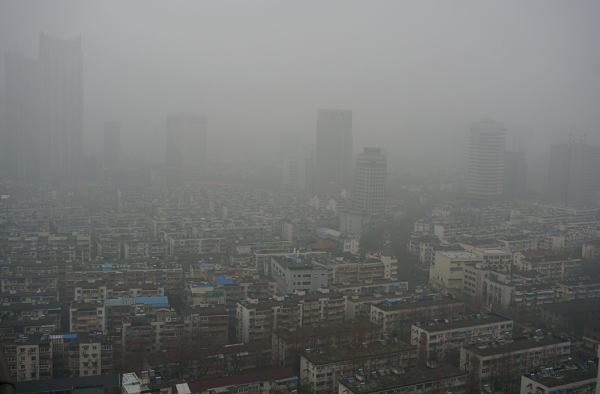How Pollution Is Harming Your Heart

Diesel pollution is seriously harming your heart, according to new findings presented at the European Society of Cardiology’s EuroCMR 2017 event. It's also a cause of inflammation throughout the whole body, and linked to constricted blood vessles and high blood pressure, according to the research.
"There is strong evidence that particulate matter (PM) emitted mainly from diesel road vehicles is associated with increased risk of heart attack, heart failure, and death," lead study author Dr. Nay Aung, cardiologist and Wellcome Trust research fellow at the Queen Mary University of London, said in a statement. "This appears to be driven by an inflammatory response - inhalation of fine particulate matter (PM2.5) causes localised inflammation of the lungs followed by a more systemic inflammation affecting the whole body. "
Particulate matter is a mix of small particles and drops of liquid that are found in the air. Inhalation of these tiny substances can seriously affect the heart and lungs. Fine particulate matter as discussed in this study has a diameter no bigger than 2.5 micrometers. The Environmental Protection Agency in the United States likens it to human hair, explaining that a single strand is 70 micrometers. In comparison, fine particulate matter is 30 times smaller.
For the study, researchers looked at whether fine particulate matter caused direct damage to the heart. More than 4,200 participants from the United Kingdom participated with an average age of 62. An MRI was used to look at the heart and exposure to PM2.5 was determined based on each person’s home address. They found that as exposure to fine particulate matter increased, the heart got bigger and declined in function.
Additionally, scientists found that people with more education did not have larger hearts with reduced function from exposure to the particles.
"People who were highly educated were less likely to have harmful effects on the heart from pollution,” Aung said. “This could be due to a number of factors including better housing and workplace conditions, which reduce pollution exposure. Educated people may also be more aware of their health, have healthier lifestyles, and have better access to healthcare."
According to Aung, these particles cause systemic inflammation, constricted blood vessels and high blood pressure. Combined, these increase the pressure in the heart, which makes your ticker larger as a way to deal with the stress. A larger heart leads to reduced efficiency.
Data from The World Bank puts the average yearly exposure to fine particulate matter in the U.S. at 8 micrograms per cubic meter. The EPA’s National Ambient Air Quality Standards cap the annual mean at no more than 12 micrograms per cubic meter for protection against people and 15 for animals, crops, vegetation and buildings.
To cut down on exposure, Aung suggests staying indoors during heavily polluted times, like rush hour traffic, and walking on the pavement furthest away from cars.
Copyright Medical Daily News Service. All rights reserved.



















